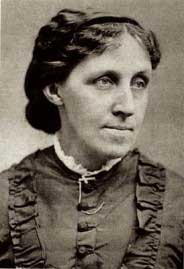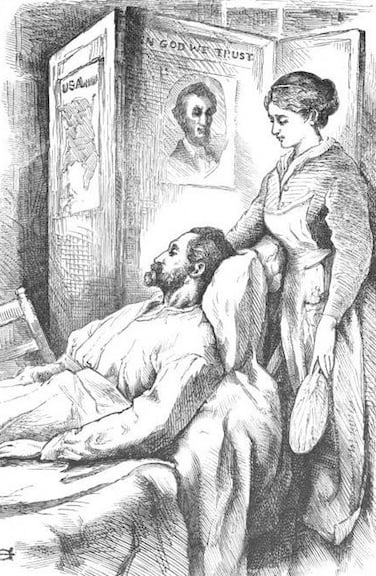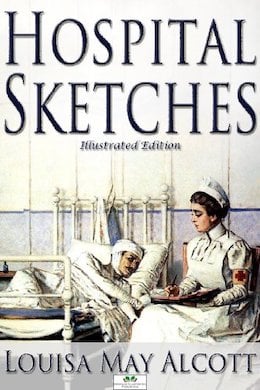Civil War Journal Journal Entries by Louisa May Alcott Close Read Notes Answers
Louisa May Alcott'south Civil War Journals
Past | On | Comments (0)

Some years before Niggling Women made her famous, Louisa May Alcott volunteered every bit a nurse at a makeshift Union hospital in Washington, D.C. in 1862. The Ceremonious War was raging. Alcott'south Civil War journals describing her experiences, along with the messages she sent habitation, provided the basis forHospital Sketches (1863).
Though the experience was frustratingly brusk for the fledgling author who wanted to feel all of life, good and bad, her writings provided richly drawn views of the terrible conditions in the infirmary, commentary on women'south roles in the war effort, race issues in the armed forces, and more. Read more about Louisa May Alcott as Ceremonious War Nurse.
Alcott became deathly sick with typhoid fever merely about a calendar month into her service, and though she fought it, in the stop had to let her father come and bring her home, where she connected in a delirium for some weeks.
Once she regained her strength, she took up her pen one time over again. Hospital Sketches became a standard for Civil War literature, primarily for Northern audiences. for the reading public in the North. Here is more about Alcott's service equally a nurse, and post-obit are some of her journal notes. Some of the long paragraphs of the original accept been cleaved up for easier reading.
. . . . . . . . . .
Journal kept at the Hospital, Georgetown, D. C., 1862.
November, 1862
November.– Thirty years quondam. Decided to go to Washington equally nurse if I could find a place. Help needed, and I love nursing, andmust let out my pent-up energy in some new way. Winter is always a hard and a tiresome fourth dimension, and if I am away at that place is one less to feed and warm and worry over.
I want new experiences, and am sure to get 'em if I go. And so I've sent in my name, and abide my time writing tales, to leave all snug backside me, and mending up my old clothes,–for nurses don't need dainty things, thank Sky!
Dec, 1862
Dec.– On the 11th I received a annotation from Miss H. M. Stevenson telling me to start for Georgetown next day to fill a place in the Union Hotel Infirmary. Mrs. Ropes of Boston was matron, and Miss Kendall of Plymouth was a nurse at that place, and though a hard place, help was needed. I was fix, and when my commander said "March!" I marched. Packed my trunk, and reported in B. that aforementioned evening.
We had all been total of courage till the last moment came; then nosotros all broke down. I realized that I had taken my life in my hand, and might never run across them all again.
I said, "Shall I stay, Mother?" equally I hugged her close. "No, get! and the Lord exist with you!" answered the Spartan woman; and till I turned the corner she bravely smiled and waved her wet handkerchief on the door-footstep. Shall I always see that dear old face again?
And so I set forth in the Dec twilight, with May and Julian Hawthorne every bit escort, feeling as if I was the son of the house going to war.
Friday, the twelfth, was a very memorable day, spent in running all over Boston to get my pass, etc., calling for parcels, getting a tooth filled, and buying a veil,–my merely buy. A. C. gave me some old dress; the dearest Sewalls money for myself and boys, lots of dearest and help; and at five p.m., saying "good-goodbye" to a grouping of tearful faces at the station, I started on my long journey, full of hope and sorrow, courage and plans.
. . . . . . . . . .

Run into besides: Louisa May Alcott equally Civil War Nurse
. . . . . . . . . .
A most interesting journeying into a new world full of stirring sights and sounds, new adventures, and an ever-growing sense of the slap-up task I had undertaken.
I said my prayers every bit I went rushing through the country white with tents, all alive with patriotism, and already red with claret.
A solemn time, but I'm glad to alive in it; and am sure it will practise me good whether I come up out alive or dead.
All went well, and I got to Georgetown i evening very tired. Was kindly welcomed, slept in my narrow bed with two other room-mates, and on the morrow began my new life by seeing a poor human being dice at dawn, and sitting all day between a male child with pneumonia and a homo shot through the lungs.
A foreign day, only I did my best; and when I put mother's little blackness shawl circular the male child while he sat upwardly panting for breath, he smiled and said, "You are real motherly, ma'am." I felt as if I was getting on.
The man only lay and stared with his large black optics, and made me very nervous. But all were well behaved; and I sabbatum looking at the twenty strong faces every bit they looked dorsum at me,–the only new thing they had to amuse them,–hoping that I looked "motherly" to them; for my thirty years made me experience former, and the suffering round me made me long to comfort every one.
Jan, 1863
January, 1863. Matrimony Hotel Hospital, Georgetown, D. C. – I never began the twelvemonth in a stranger identify than this: five hundred miles from home, lonely, among strangers, doing painful duties all day long, and leading a life of constant excitement in this swell house, surrounded by three or four hundred men in all stages of suffering, disease, and death.
Though often homesick, heartsick, and worn out, I similar it, find real pleasure in comforting, tending, and auspicious these poor souls who seem to dear me, to experience my sympathy though unspoken, and acknowledge my hearty good-will, in spite of the ignorance, awkwardness, and bashfulness which I cannot assistance showing in and so new and trying a situation.
The men are docile, respectful, and affectionate, with but few exceptions; truly lovable and manly many of them. John Sulie, a Virginia blacksmith, is the prince of patients; and though what nosotros call a common man in education and condition, to me is all I could wait or inquire from the first admirer in the land.
Nether his plain speech and unpolished manner I seem to meet a noble grapheme, a heart as warm and tender as a woman'due south, a nature fresh and frank as any kid's. He is nigh thirty, I retrieve, alpine and handsome, mortally wounded, and dying royally without reproach, repining, or remorse.
Mrs. Ropes and myself love him, and feel indignant that such a human being should exist and then early lost; for though he might never distinguish himself before the globe, his influence and example cannot be without event, for real goodness is never wasted.
Monday, 4th.– I shall record the events of a 24-hour interval as a sample of the days I spend:
Up at half dozen, clothes by gaslight, run through my ward and throw upwards the windows, though the men grumble and shiver; just the air is bad enough to brood a pestilence; and as no notice is taken of our frequent appeals for better ventilation, I must do what I can. Poke upwards the fire, add blankets, joke, coax, and control; simply continue to open doors and windows as if life depended upon information technology.
Mine does, and doubtless many another, for a more perfect pestilence-box than this business firm I never saw — cold, damp, dirty, total of vile odors from wounds, kitchens, wash-rooms, and stables. No competent head, male or female, to right matters, and a jumble of good, bad, and indifferent nurses, surgeons, and attendants, to complicate the anarchy notwithstanding more.
After this unwelcome progress through my stifling ward, I go to breakfast with what appetite I may; notice the uninvitable fried beef, table salt butter, croaking bread, and washy coffee; listen to the clack of 8 women and a dozen men — the starting time silly, stupid, or possessed of one idea; the last absorbed with their breakfast and themselves to a degree that is both ludicrous and provoking, for all the dishes are ordered down the tablefull and returnedempty …
… the conversation is entirely among themselves, and each announces his opinion with an air of importance that frequently causes me to choke in my cup, or bolt my meals with undignified speed lest a laugh betray to these famous beings that a "chiel'southward amang them takin' notes."
Till noon I trot, trot, giving out rations, cutting upwardly food for helpless "boys," washing faces, teaching my attendants how beds are made or floors are swept, dressing wounds, taking Dr. F. P.'s orders (privately wishing all the time that he would exist more gentle with my big babies), dusting tables, sewing bandages, keeping my tray tidy, rushing up and down later on pillows, bed-linen, sponges, books, and directions, till it seems as if I would joyfully pay down all I possess for fifteen minutes' rest …
. . . . . . . . . .

A sanitized moving-picture show of the Wedlock Hotel Infirmary
. . . . . . . . . .
Supper at 5 sets every one to running that can run; and when that flurry is over, all settle down for the evening amusements, which consist of newspapers, gossip, the doctor'due south last round, and, for such as need them, the concluding doses for the night. At nine the bong rings, gas is turned down, and twenty-four hours nurses go to bed. Night nurses go on duty, and sleep and death accept the house to themselves.
My work is changed to night watching, or one-half night and half day – from twelve to twelve. I like it, every bit it leaves me fourth dimension for a morn run, which is what I need to keep well; for bad air, food, and h2o, work and watching, are getting to be likewise much for me. I trot up and downwardly the streets in all directions, sometimes to the Heights, and then half way to Washington, again to the hill, over which the long trains of army wagons are constantly vanishing and ambulances actualization. That way the fighting lies, and I long to follow.
Ordered to go along my room, being threatened with pneumonia. Sharp hurting in the side, cough, fever, and dizziness. A pleasant prospect for a lone soul five hundred miles from dwelling! Sit down and sew on the boys' wearing apparel, write messages, sleep, and read; try to talk and continue merry, simply fail decidedly, as day after day goes, and I feel no better.
Dream awfully, and wake unrefreshed, think of domicile, and wonder if I am to die hither, as Mrs. R., the matron, is likely to do. Feel too miserable to care much what becomes of me.
. . . . . . . . . .

Illustration from a later edition of Hospital Sketches
. . . . . . . . . .
Dr. S. creaks up twice a day to experience my pulse, give me doses, and ask if I am at all consumptive, or some other cheering question. Dr. O. examines my lungs and looks sober. Dr. J. haunts the room, coming past mean solar day and nighttime with woods, cologne, books, and messes, like a motherly little man as he is. Nurses fussy and anxious, matron dying, and everything very gloomy. They desire me to go home, just Iwon't even so.
January 16th–Was amazed to meet Father enter the room that morning, having been telegraphed to past order of Mrs. R. without request leave. I was very angry at first, though glad to run across him, because I knew I should have to go. Mrs. D. and Miss Dix came, and pretty Miss W., to accept me to Willard'southward to be cared for by them. I wouldn't go, preferring to keep still, beingness pretty ill by that fourth dimension.
On the 21st I suddenly decided to go dwelling, feeling very strangely, and dreading to be worse. Mrs. R. died, and that frightened the doctors about me; for my trouble was the same,–typhoid pneumonia. Father, Miss Grand., and Lizzie T. went with me. Miss Dix brought a handbasket full of bottles of wine, tea, medicine, and cologne, besides a piddling blanket and pillow, a fan, and a testament. She is a kind old soul, but very queer and capricious.
Was very sorry to become, and "my boys" seemed deplorable to have me. Quite a flock came to come across me off; merely I was as well ill to have but a dim idea of what was going on.
Had a strange, excited journeying of a twenty-four hours and nighttime,–one-half asleep, one-half wandering, just conscious that I was going dwelling house; and, when I got to Boston, of being taken out of the car, with people looking on every bit if I was a sight. I daresay I was all blowzed, crazy, and weak. Was too sick to reach Concord that night, though we tried to practice so. Spent it at Mr. Sewall's; had a sort of fit; they sent for Dr. H., and I had a dreadful time of information technology.
. . . . . . . . . .

Louisa May Alcott books on Bookshop.org*
Louisa May Alcott folio on Amazon*
. . . . . . . . . .
Side by side morning felt better, and at four went home. Just recall seeing May'south shocked face at the depot, Mother's bewildered one at home, and getting to bed in the business firm conventionalities that the house was roofless, and no ane wanted to see me.
As I never shall forget the strange fancies that haunted me, I shall amuse myself with recording some of them.
The most vivid and indelible was the conviction that I had married a stout, handsome Spaniard, dressed in black velvet, with very soft hands, and a voice that was continually saying, "Lie however, my dear!"
This was Mother, I suspect; just with all the comfort I oft institute in her presence, there was blended an awful fear of the Spanish spouse who was always coming after me, appearing out of closets, in at windows, or threatening me dreadfully all night long. I appealed to the Pope, and actually got up and made a touching plea in something meant for Latin, they tell me.
Once I went to heaven, and found information technology a twilight place, with people darting through the air in a queer way — all very busy, and dismal, and ordinary. Miss Dix, W. H. Channing, and other people were there; but I thought it night and "tedious," and wished I hadn't come.
A mob at Baltimore breaking down the door to go me, being hung for a witch, burned, stoned, and otherwise maltreated, were some of my fancies. Also being tempted to join Dr. W. and two of the nurses in worshipping the Devil. Also tending millions of rich men who never died or got well.
. . . . . . . . . .

Hospital Sketches past Louisa May Alcott on Amazon*
. . . . . . . . . .
February, 1862
February– Recovered my senses later on iii weeks of delirium, and was told I had had a very bad typhoid fever, had nearly died, and was however very ill. All of which seemed rather curious, for I remembered nothing of information technology. Found a queer, thin, large-eyed face when I looked in the glass; didn't know myself at all; and when I tried to walk discovered that I couldn't, and cried because my legs wouldn't get.
Never having been sick before, information technology was all new and very interesting when I got repose enough to understand matters. Such long, long nights; such feeble, idle days; dozing, fretting almost nada; longing to consume, and no mouth to do information technology with — mine beingness and so sore, and total of all manner of queer sensations, it was nix but a plague. The old fancies withal lingered, seeming then real I believed in them, and deluded Mother and May with the most absurd stories, so soberly told that they thought them true.
. . . . . . . . . .
*These are Bookshop Affiliate and Amazon Affiliate links. If a product is purchased by linking through, Literary Ladies Guide receives a small-scale commission, which helps maintain our site and helps information technology to proceed growing!
Categories: Literary Musings
drakesullumeent1998.blogspot.com
Source: https://www.literaryladiesguide.com/literary-musings/louisa-may-alcotts-civil-war-journals/
Belum ada Komentar untuk "Civil War Journal Journal Entries by Louisa May Alcott Close Read Notes Answers"
Posting Komentar